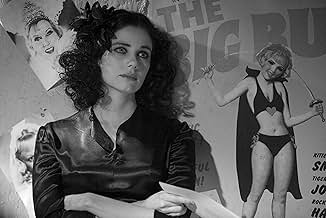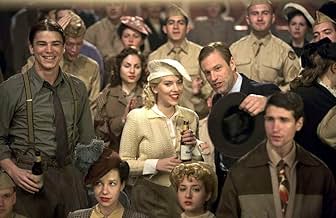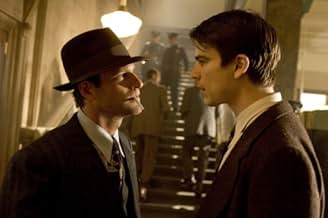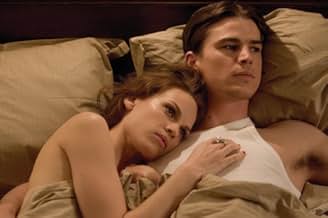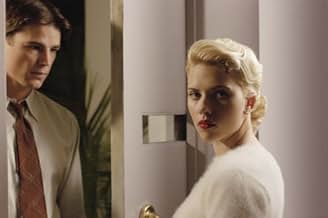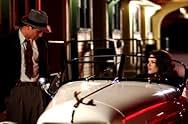IMDb रेटिंग
5.6/10
79 हज़ार
आपकी रेटिंग
ब्लैक डाहलिया एलिज़ाबेथ शार्ट की हत्या की जांच के परिणाम स्वरूप दो पुलिसकर्मी अपने व्यक्तिगत और पेशेवर जीवन को बिखरते हुए देखते हैं.ब्लैक डाहलिया एलिज़ाबेथ शार्ट की हत्या की जांच के परिणाम स्वरूप दो पुलिसकर्मी अपने व्यक्तिगत और पेशेवर जीवन को बिखरते हुए देखते हैं.ब्लैक डाहलिया एलिज़ाबेथ शार्ट की हत्या की जांच के परिणाम स्वरूप दो पुलिसकर्मी अपने व्यक्तिगत और पेशेवर जीवन को बिखरते हुए देखते हैं.
- निर्देशक
- लेखक
- स्टार
- 1 ऑस्कर के लिए नामांकित
- 4 जीत और कुल 16 नामांकन
Angus MacInnes
- Capt. John Tierney
- (as Angus MacInnis)
फ़ीचर्ड समीक्षाएं
Now I like Brian DePalma, and I love Carrie, The Untouchables and Carlito's Way. Out of the films of his I've seen, The Black Dahlia is my least favourite in my view, though I was also rather disappointed in Scarface too.
I was really interested in its concept and the story seemed interesting. Also the film is very well made, with stylish cinematography and beautiful scenery, costumes, sets and makeup, DePalma's direction has occasional flashes of brilliance and the music was quite nice as well.
However, this is another case of style over substance. The script falls flat, with little idea of which direction to go, and the tone of the story is also uneven with some scenes disappointingly over-the top. The characters I felt indifferent to, and I also thought they were quite shallow and poorly explored, the pace is rather meandering and with exception of Fiona Shaw who's quite good the acting is bland. Also the ending I think is overdone.
All in all, interesting initially and while well made it is emotionally hollow and flat in its scripting and characterisation. 4/10 Bethany Cox
I was really interested in its concept and the story seemed interesting. Also the film is very well made, with stylish cinematography and beautiful scenery, costumes, sets and makeup, DePalma's direction has occasional flashes of brilliance and the music was quite nice as well.
However, this is another case of style over substance. The script falls flat, with little idea of which direction to go, and the tone of the story is also uneven with some scenes disappointingly over-the top. The characters I felt indifferent to, and I also thought they were quite shallow and poorly explored, the pace is rather meandering and with exception of Fiona Shaw who's quite good the acting is bland. Also the ending I think is overdone.
All in all, interesting initially and while well made it is emotionally hollow and flat in its scripting and characterisation. 4/10 Bethany Cox
Have you ever been with a master storyteller who is hot? I mean in person. Its an absolutely captivating thing, watching the craft of captivating you. Its a worthy experience, even when the story isn't good. In fact, its even better when they story isn't good. You might wonder for a while why such a talented teller would choose the material she has, but will fade as you fall under spell of the storyteller, undistracted by the story. It you are lucky, she'll be a hand dancer and you will simply allow your soul to move with the undermusic.
dePalma never bothers me when he chooses bad actors, stories and such. Its just not relevant to what he has to offer, and in fact sometimes I'm thankful that the story itself doesn't get in the way. "Mission to Mars" was rewarmed tacos, but the fact that it was served by a metaphoric, genuine Spanish grandmother from her own hands was all that mattered.
About 22 minutes into this there is a wonderful crane shot, probably done without artificial assistance, beginning five minutes which is the heart of the overly complex story. It sets up two apparently unrelated threads in the story that interweave from this point. It is of the front of a building where later there will be a shooting, moves up and over the building to look at a vacant lot behind where we see a woman making a gruesome discovery. She runs to the street alongside the building where we see the car of our two cops coming to park in front and engage in a shooting. We move in front of the car to a bicyclist, who plays no role in the story. He brings us to a couple walking down the sidewalk approaching the front of the building where they will encounter our cops. We come down to street height and listen in on their conversation.
Its masterful. Even if you think everything that follows is a mess, its a glorious mess made glorious by our setting of the knitting needles.
This, my friends, is what noir is about these days: establishing an eye of god who both is us and who perturbs nature to suit conventions of coincidence in storytelling.
But there's another joy here too. The story no surprise features a film within the film. Its the whole story, there, with elements of that internal film overlapping the main story in three or four significant ways. The star of this inner film, who also is our bisected victim is a character played by Mia Kirshner. She's so much more alive and real than anyone else in the main story, I can only assume it was deliberate and a truly thrilling risk. If you follow film, you'll know her very similar and hugely complex role in "Exotica," a landmark film.
Two major experiences in a film! Of course its worth watching!
Ted's Evaluation -- 3 of 3: Worth watching.
dePalma never bothers me when he chooses bad actors, stories and such. Its just not relevant to what he has to offer, and in fact sometimes I'm thankful that the story itself doesn't get in the way. "Mission to Mars" was rewarmed tacos, but the fact that it was served by a metaphoric, genuine Spanish grandmother from her own hands was all that mattered.
About 22 minutes into this there is a wonderful crane shot, probably done without artificial assistance, beginning five minutes which is the heart of the overly complex story. It sets up two apparently unrelated threads in the story that interweave from this point. It is of the front of a building where later there will be a shooting, moves up and over the building to look at a vacant lot behind where we see a woman making a gruesome discovery. She runs to the street alongside the building where we see the car of our two cops coming to park in front and engage in a shooting. We move in front of the car to a bicyclist, who plays no role in the story. He brings us to a couple walking down the sidewalk approaching the front of the building where they will encounter our cops. We come down to street height and listen in on their conversation.
Its masterful. Even if you think everything that follows is a mess, its a glorious mess made glorious by our setting of the knitting needles.
This, my friends, is what noir is about these days: establishing an eye of god who both is us and who perturbs nature to suit conventions of coincidence in storytelling.
But there's another joy here too. The story no surprise features a film within the film. Its the whole story, there, with elements of that internal film overlapping the main story in three or four significant ways. The star of this inner film, who also is our bisected victim is a character played by Mia Kirshner. She's so much more alive and real than anyone else in the main story, I can only assume it was deliberate and a truly thrilling risk. If you follow film, you'll know her very similar and hugely complex role in "Exotica," a landmark film.
Two major experiences in a film! Of course its worth watching!
Ted's Evaluation -- 3 of 3: Worth watching.
It has been almost ten years since Curtis Hanson delivered what was arguably the best picture of 1997, L.A. Confidential. That movie was great in almost every way (my key dislike was only in the performance of Kim Basinger, yet the Academy did not agree with me), and a big part of that was due to the source material from James Ellroy. And now comes The Black Dahlia, another one of Ellroy's books based on detectives in the 1940's, only revolving around a real event and having master filmmaker Brian De Palma at the helm. And unfortunately, the film comes with mixed results.
After taking part in a boxing match which ends up giving a whole lot more power to the L.A.P.D., Dwight "Bucky" Bleichert (Josh Hartnett) and Leland "Lee" Blanchard (Aaron Eckhart) are promoted to detectives and become partners. Shortly afterwards, they become entangled in the brutal murder of Elizabeth Short (Mia Kirshner), otherwise known as the titular Black Dahlia. What follows for them is a tale of corruption, greed and vengeance. It may not seem like much (not too mention the femme fatales of Scarlett Johansson and Hilary Swank), but the film really has a lot going on.
And this is where a bit of the problems lie.
Some of the events that occur over the course of the film, are just completely random and almost unexplainable. Hell, random subplots appear and disappear faster than they come up. When it really starts getting down to business, the movie becomes downright confusing, and the narrative does not let up for anyone to truly figure it all out. It gets especially bizarre in the final act, when almost nothing truly makes sense, and we just have to sit and just contend with what ends up happening. It makes it seem like they want the audience to sift through and determine what is relevant to the film and what is not, and only then can they truly grasp onto a full understanding. Even after watching the film a few hours ago, I still question some of the things that happened.
I think one of the key reasons it does not make a whole whack of sense is the fact that it revolves around a real event. Last week's Hollywoodland had this same problem in that the filmmakers do not seem to have an idea of where to draw your attention. Do they want the focus on the murder itself, or do they want the focus on the cops investigating it? Adding in a few seemingly bizarre backstories does not help this either. They seem to strike gold when they focalize on what the murder and its impending investigation is doing to Bucky and Lee, but they do not spend enough time expressing it. They touch on it in passing, and instead, cut to either useless items, or completely random things. You can tell that there is some form of direction however, just not enough.
Hartnett plays Bucky very smoothly, and does a very adequate job in his narration. He really lacks the zest to make his character interesting however, and has a really tough time trying to make the audience care about him. He just does not seem to have the hard-boiled cop schtick nailed down here, and only comes off as a little less than soft-boiled. Eckhart on the other hand, does have the zest and really shines through as Lee. His character goes through most of the changing during the film, and you can see the dramatic change of character as the film progresses. He just does not have nearly enough screen time to truly flesh him from being the strange and mysterious character.
Johansson does well for herself as the girl stuck between the two partners, and only sparingly gets the opportunity to stretch out her enigmatic character. Swank on the other hand, feels completely useless in the scheme of things (until her character actually serves a purpose later in the film). Her disappear/reappearing Scottish accent is laughable, and her whole performance really begs the question of how she has managed to snag two Best Actress Oscars in less than ten years. Supporting work, especially from Mike Starr, Fiona Shaw and the flashback heavy Kirshner, are all on the mark and are fairly well done in their limited roles.
Whereas there were problems with many other things, there are none with the sets, costumes and cinematography. This is 1940's Los Angeles, and it looks gorgeous. Every single minute detail seems to have been polished and amped up to the point of looking like it was filmed sixty years ago. It makes the film feel more realistic than it is, and makes the sheer "coolness" of the settings and characters stand right out. Although it may be advertised as being noir, it really is nowhere near as dark as it could have been. Yet, it still has enough packed into it to make this film visually astonishing.
Another standout is the feel of it being a De Palma film. The camera angles, the slow motion, the violence, the sheer editing of it all (especially the worn black and white film clips of Kirshner as Short), just screams old school De Palma. From the start, even with its problems, the audience knows it is in the hands of a style master, and in that regard, the film is consistent and on the mark.
But unfortunately, that same phrase cannot be used to describe the rest of the film. It is truly a mixed bag, but despite its confusing narrative, it is still interesting and stylish as hell. But I still cannot help but be disappointed overall. I guess I was just expecting a whole lot more.
7/10.
After taking part in a boxing match which ends up giving a whole lot more power to the L.A.P.D., Dwight "Bucky" Bleichert (Josh Hartnett) and Leland "Lee" Blanchard (Aaron Eckhart) are promoted to detectives and become partners. Shortly afterwards, they become entangled in the brutal murder of Elizabeth Short (Mia Kirshner), otherwise known as the titular Black Dahlia. What follows for them is a tale of corruption, greed and vengeance. It may not seem like much (not too mention the femme fatales of Scarlett Johansson and Hilary Swank), but the film really has a lot going on.
And this is where a bit of the problems lie.
Some of the events that occur over the course of the film, are just completely random and almost unexplainable. Hell, random subplots appear and disappear faster than they come up. When it really starts getting down to business, the movie becomes downright confusing, and the narrative does not let up for anyone to truly figure it all out. It gets especially bizarre in the final act, when almost nothing truly makes sense, and we just have to sit and just contend with what ends up happening. It makes it seem like they want the audience to sift through and determine what is relevant to the film and what is not, and only then can they truly grasp onto a full understanding. Even after watching the film a few hours ago, I still question some of the things that happened.
I think one of the key reasons it does not make a whole whack of sense is the fact that it revolves around a real event. Last week's Hollywoodland had this same problem in that the filmmakers do not seem to have an idea of where to draw your attention. Do they want the focus on the murder itself, or do they want the focus on the cops investigating it? Adding in a few seemingly bizarre backstories does not help this either. They seem to strike gold when they focalize on what the murder and its impending investigation is doing to Bucky and Lee, but they do not spend enough time expressing it. They touch on it in passing, and instead, cut to either useless items, or completely random things. You can tell that there is some form of direction however, just not enough.
Hartnett plays Bucky very smoothly, and does a very adequate job in his narration. He really lacks the zest to make his character interesting however, and has a really tough time trying to make the audience care about him. He just does not seem to have the hard-boiled cop schtick nailed down here, and only comes off as a little less than soft-boiled. Eckhart on the other hand, does have the zest and really shines through as Lee. His character goes through most of the changing during the film, and you can see the dramatic change of character as the film progresses. He just does not have nearly enough screen time to truly flesh him from being the strange and mysterious character.
Johansson does well for herself as the girl stuck between the two partners, and only sparingly gets the opportunity to stretch out her enigmatic character. Swank on the other hand, feels completely useless in the scheme of things (until her character actually serves a purpose later in the film). Her disappear/reappearing Scottish accent is laughable, and her whole performance really begs the question of how she has managed to snag two Best Actress Oscars in less than ten years. Supporting work, especially from Mike Starr, Fiona Shaw and the flashback heavy Kirshner, are all on the mark and are fairly well done in their limited roles.
Whereas there were problems with many other things, there are none with the sets, costumes and cinematography. This is 1940's Los Angeles, and it looks gorgeous. Every single minute detail seems to have been polished and amped up to the point of looking like it was filmed sixty years ago. It makes the film feel more realistic than it is, and makes the sheer "coolness" of the settings and characters stand right out. Although it may be advertised as being noir, it really is nowhere near as dark as it could have been. Yet, it still has enough packed into it to make this film visually astonishing.
Another standout is the feel of it being a De Palma film. The camera angles, the slow motion, the violence, the sheer editing of it all (especially the worn black and white film clips of Kirshner as Short), just screams old school De Palma. From the start, even with its problems, the audience knows it is in the hands of a style master, and in that regard, the film is consistent and on the mark.
But unfortunately, that same phrase cannot be used to describe the rest of the film. It is truly a mixed bag, but despite its confusing narrative, it is still interesting and stylish as hell. But I still cannot help but be disappointed overall. I guess I was just expecting a whole lot more.
7/10.
Fictional movie based on a real unsolved Hollywood murder in the 1940s. The mutilated body of Elizabeth Short (Mia Kirschner) is found in an empty lot. Officer Dwight Bleichert (Josh Harnett) and Sgt. Leland Blanchard (Aaron Eckhart) are assigned to the case. Blanchard becomes obsessed with the case causing troubles with his girlfriend Kay Lake (Scarlett Johansson). She then falls for Bleichert. Then there are more murders and lesbians and incest are thrown in...
The plot is a little too convoluted but so was the book (by Jack Ellroy). To be totally honest I can't understand why this is getting blasted by the critics. It's no masterpiece but it's 100 times better than director Brian DePalma's last film (2002's terrible "Femme Fatale") and probably his best work since 1996's "Mission Impossible". The 1940s setting is beautifully captured with clothes and settings--this film really looks great. DePalma once again gives us some incredible visual sequences--one murder is downright terrifying and one of the best things he's done in years. Also the plot, while involved, does reach a logical, satisfying conclusion. However the film isn't perfect.
There's a lesbian bar here that's really overdone. It's beautiful, with a ridiculously elaborate stage show--but in 1940s Hollywood? I don't think so. The acting is all over the place. Eckhart OVERACTS to a ridiculous degree. Hartnett is terrible (no surprise there) but so are Johansson and Hilary Swank (both wonderful actresses). It seems like Harnett's presence bring them down to his level of non acting. Last, and least, is English actress Fiona Lewis who is certainly acting but not in this picture. She overdoes it so much she makes Eckhart look restrained.
So I DID like it but with a tighter story and a better leading man this might have been great. As it stands it's a very good, well-made movie with some questionable acting. I give it a 7.
The plot is a little too convoluted but so was the book (by Jack Ellroy). To be totally honest I can't understand why this is getting blasted by the critics. It's no masterpiece but it's 100 times better than director Brian DePalma's last film (2002's terrible "Femme Fatale") and probably his best work since 1996's "Mission Impossible". The 1940s setting is beautifully captured with clothes and settings--this film really looks great. DePalma once again gives us some incredible visual sequences--one murder is downright terrifying and one of the best things he's done in years. Also the plot, while involved, does reach a logical, satisfying conclusion. However the film isn't perfect.
There's a lesbian bar here that's really overdone. It's beautiful, with a ridiculously elaborate stage show--but in 1940s Hollywood? I don't think so. The acting is all over the place. Eckhart OVERACTS to a ridiculous degree. Hartnett is terrible (no surprise there) but so are Johansson and Hilary Swank (both wonderful actresses). It seems like Harnett's presence bring them down to his level of non acting. Last, and least, is English actress Fiona Lewis who is certainly acting but not in this picture. She overdoes it so much she makes Eckhart look restrained.
So I DID like it but with a tighter story and a better leading man this might have been great. As it stands it's a very good, well-made movie with some questionable acting. I give it a 7.
Anybody expecting to get a great account of the Black Dahlia case, even fictional, will be disappointed going in to this movie. Of course, I knew that it was a fictionalization of the case, but I had no idea the movie would present its own evidence and draw its own conclusions.
But the main problem here is not the lack of factual detail, so much as the confusion of plot that surrounds and overwhelms the Black Dahlia case itself. So much plot and character and sideplots and backstory are built around the central characters that the case itself seems like a distraction. A key plot point and character motivator is the fascination of the two detectives with the murder, but this is never elaborated enough in the film, and we're left to half-heartedly guess at the character motivations.
The tone is never consistently campy, but when the camp arrives it overwhelms the story. A dinner scene between a suspect and her family had the crowd in stitches (the only scene during which the audience laughed). The problem is that the scene is valuable to the plot and should never have been played for laughs. Hitchcock or even Lynch could have shot the same scene, with the same events and dialogue, and made it menacing and creepy, which it needed to be to function in the mystery.
Other problems: De Palma uses the lesbian angle of the movie (never a part of the case) to full exploitative advantage, and the actresses seem unable to master to the expressive 1940s style acting that would have come naturally to even a marginal 40s star.
Although the film brings a clearcut finale rather than a vague puzzle, too many loose threads come together too neatly and rather than bringing the film to a satisfactory conclusion, it leaves you scratching your head, is this what I spent the last 2 hours waiting to hear? Overall, there is too much plot, too little character development and a wildly uneven tone. The movie has its moments but it's a blinding mess all together.
But the main problem here is not the lack of factual detail, so much as the confusion of plot that surrounds and overwhelms the Black Dahlia case itself. So much plot and character and sideplots and backstory are built around the central characters that the case itself seems like a distraction. A key plot point and character motivator is the fascination of the two detectives with the murder, but this is never elaborated enough in the film, and we're left to half-heartedly guess at the character motivations.
The tone is never consistently campy, but when the camp arrives it overwhelms the story. A dinner scene between a suspect and her family had the crowd in stitches (the only scene during which the audience laughed). The problem is that the scene is valuable to the plot and should never have been played for laughs. Hitchcock or even Lynch could have shot the same scene, with the same events and dialogue, and made it menacing and creepy, which it needed to be to function in the mystery.
Other problems: De Palma uses the lesbian angle of the movie (never a part of the case) to full exploitative advantage, and the actresses seem unable to master to the expressive 1940s style acting that would have come naturally to even a marginal 40s star.
Although the film brings a clearcut finale rather than a vague puzzle, too many loose threads come together too neatly and rather than bringing the film to a satisfactory conclusion, it leaves you scratching your head, is this what I spent the last 2 hours waiting to hear? Overall, there is too much plot, too little character development and a wildly uneven tone. The movie has its moments but it's a blinding mess all together.
क्या आपको पता है
- ट्रिवियाWhen Dwight "Bucky" Bleichert goes searching through some photographs, you can see a real autopsy photo of Elizabeth Short.
- गूफ़When Bucky Bleichert enters Sheryl Saddon's bedroom to get the suitcase, there is a postcard-sized picture of Bettie Page on the wall. Bettie Page did not start modeling until 1950.
- भाव
Emmet Linscott: What kind of name is Bleichert? Dutch?
Ofcr. Dwight "Bucky" Bleichert: German.
Emmet Linscott: Ah, a great people, the Germans. Hitler was a bit excessive. But mark my words that someday we'll regret not joining forces with him to fight the Reds.
- साउंडट्रैकIn the Mood
Written by Joe Garland (as Joseph C. Garland)
Used by Permission of Shapiro Bernstein & Co. Inc. (ASCAP)
टॉप पसंद
रेटिंग देने के लिए साइन-इन करें और वैयक्तिकृत सुझावों के लिए वॉचलिस्ट करें
विवरण
- रिलीज़ की तारीख़
- कंट्री ऑफ़ ओरिजिन
- भाषाएं
- इस रूप में भी जाना जाता है
- La Dalia Negra
- फ़िल्माने की जगहें
- उत्पादन कंपनियां
- IMDbPro पर और कंपनी क्रेडिट देखें
बॉक्स ऑफ़िस
- बजट
- $5,00,00,000(अनुमानित)
- US और कनाडा में सकल
- $2,25,45,080
- US और कनाडा में पहले सप्ताह में कुल कमाई
- $1,00,05,895
- 17 सित॰ 2006
- दुनिया भर में सकल
- $4,93,32,692
- चलने की अवधि
- 2 घं 1 मि(121 min)
- रंग
- ध्वनि मिश्रण
- पक्ष अनुपात
- 2.35 : 1
इस पेज में योगदान दें
किसी बदलाव का सुझाव दें या अनुपलब्ध कॉन्टेंट जोड़ें







